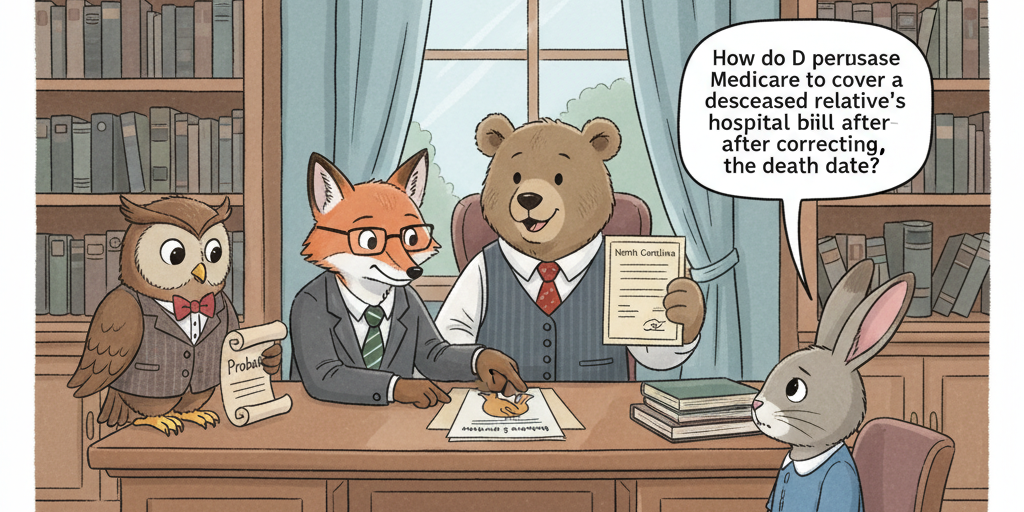How do I persuade Medicare to cover a deceased relative’s hospital bill after correcting the death date? – North Carolina
Short Answer
In North Carolina, get the death date corrected and then ask the provider or Medicare to reprocess the claim using the amended death certificate and medical records. The personal representative should collect itemized bills and Explanation of Benefits, use Medicare’s Patient’s Request for Medical Payment (Form CMS-1490S) if needed, and avoid paying the hospital until coverage is decided. Track the estate’s creditor deadlines while you pursue Medicare, because untimely claims can be barred.
Understanding the Problem
North Carolina families often ask: can I get Medicare to cover a decedent’s hospital bill if the death date on the certificate was wrong? Here, a certified copy of the amended death certificate is pending from the Register of Deeds, and a HIPAA authorization is in place to obtain hospital records. The goal is to use the corrected date to have the claim processed as covered care instead of post‑death care.
Apply the Law
Under North Carolina law, the personal representative (executor or administrator) manages debts and claims and should not pay a disputed medical bill until insurance coverage is resolved. The Clerk of Superior Court accepts multiple forms of proof of death for estate purposes (not just the death certificate), but insurers typically want the amended certificate. Medicare will consider reprocessing if you submit the corrected death date with supporting records; if a provider won’t resubmit, the estate can file Form CMS‑1490S to request payment directly. During this, the estate must honor North Carolina’s claim deadlines and pay claims in statutory order.
Key Requirements
- Fix the death date: Obtain a certified amended death certificate and relevant medical records showing time of death.
- Establish authority and records access: The personal representative uses Letters and, if needed, HIPAA releases to collect itemized bills and insurer explanations.
- Pursue coverage first: Ask the hospital to resubmit to Medicare with the corrected death date; if they refuse, submit Form CMS‑1490S with proofs.
- Protect the estate’s timelines: Publish and track the creditors’ period; late-presented claims can be barred.
- Pay in order if due: Only pay medical claims after coverage decisions and in the statutory priority if estate funds are used.
What the Statutes Say
- North Carolina Gen. Stat. § 28A-6-1 (Evidence of death for estate administration) – Clerks may accept various records to confirm date of death.
- North Carolina Gen. Stat. § 28A-19-3 (Nonclaim statute) – Sets deadlines for presenting claims against the estate.
- North Carolina Gen. Stat. § 28A-19-6 (Order of payment) – Establishes the priority for paying estate claims.
Analysis
Apply the Rule to the Facts: Because the death date was wrong, Medicare may have treated services as post‑death and denied them. Once the amended certificate arrives, the personal representative can pair it with hospital records to show services occurred before death, then have the provider resubmit or file Form CMS‑1490S. While coverage is pending, the estate should not pay the bill and should monitor the creditors’ bar date so the hospital presents its claim on time.
Process & Timing
- Who files: Personal representative. Where: With the hospital’s billing department and Medicare contractor; estate actions with the Clerk of Superior Court in the county of domicile. What: Submit the corrected death certificate, itemized bill, Explanation of Benefits, and Medicare Form CMS‑1490S if the provider will not resubmit. When: As soon as the amended certificate is received; also promptly publish Notice to Creditors to start the estate claim clock.
- Ask the provider to reopen and resubmit the claim with the corrected date; if refused or delayed, the estate files CMS‑1490S with supporting documents. Response times vary by carrier; follow up every 30–45 days and keep written records.
- After Medicare issues a determination, pay any remaining balance only if still owed and only in the statutory order of priority. If a dispute remains, the personal representative can seek direction in an estate proceeding before the Clerk.
Exceptions & Pitfalls
- If the amended death certificate is delayed, use available medical records as interim proof for the estate; insurers may still wait for the amended certificate.
- Do not pay the hospital before Medicare decides; payment can complicate reimbursement and priority accounting.
- Track Medicare’s timely filing/reopening windows shown on remittance or EOB; procedures and deadlines can change.
- If the hospital’s claim is untimely under the creditors’ bar date, it may be barred; confirm mailing of personal notices to known creditors.
- If the claim remains disputed, the personal representative can initiate an estate proceeding before the Clerk for guidance or to resolve the claim.
Conclusion
To persuade Medicare to cover a decedent’s hospital bill in North Carolina, secure a certified amended death certificate, gather medical records, and have the provider resubmit or file Form CMS‑1490S with Medicare. While coverage is pending, do not pay the bill; track the estate’s creditor deadlines and pay only in statutory order if needed. Next step: once you receive the amended death certificate, submit the corrected documentation and CMS‑1490S to Medicare immediately, because Medicare filing and reopening windows can be short.
Talk to a Probate Attorney
If you’re dealing with a hospital bill that Medicare might cover once the death date is corrected, our firm has experienced attorneys who can help you understand your options and timelines. Call us today at (919) 341-7055.
Disclaimer: This article provides general information about North Carolina law based on the single question stated above. It is not legal advice for your specific situation and does not create an attorney-client relationship. Laws, procedures, and local practice can change and may vary by county. If you have a deadline, act promptly and speak with a licensed North Carolina attorney.


